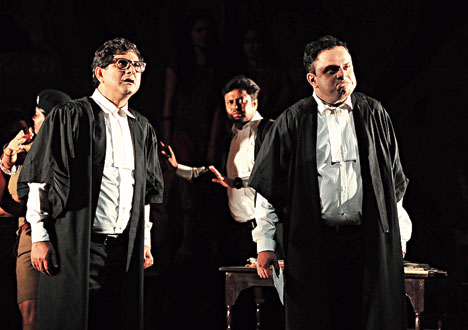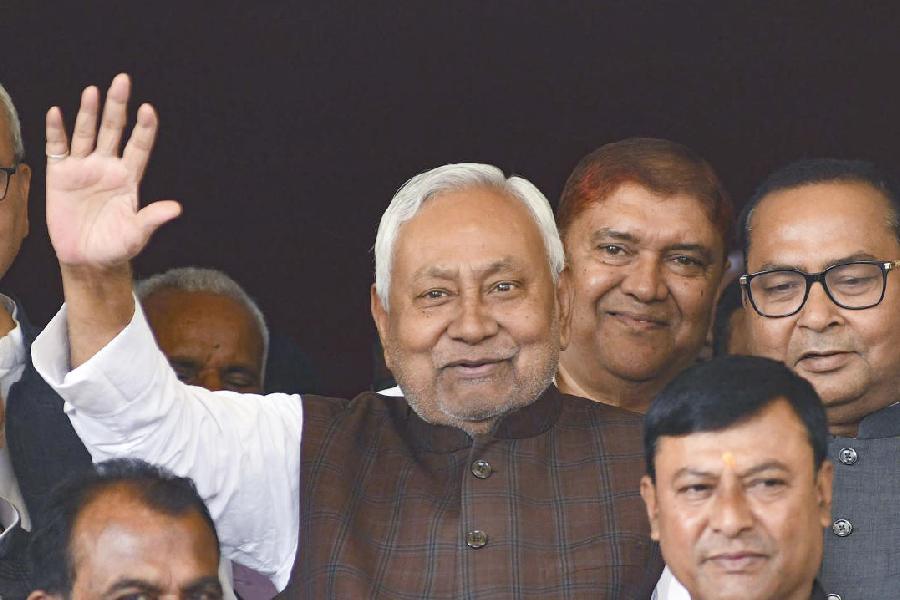
How does one determine the truth in a court of law? The process often involves the reconstruction of the events of the alleged crime and thus arriving at the truth backwards, in a piecemeal fashion.
Sateroi July, a Bratya Basu play, uses this same technique to bring forth the issues related to communal tensions in the country. The play was staged at GD Birla Sabhagar on March 23 as part of the Sabhagar Theatre Festival, in association with t2.
Set in 2003, after a riot in the Panchmahal district of Gujarat, Sateroi July shows an idealistic barrister and a champion for the minorities, Rakesh Chatterjee, played by Bratya Basu, and his face-off with the unscrupulous, non-secular lawyer Pankaj Parekh, played by Biplab Bandyopadhyay, over an accusation of rape of two women against a bunch of young men. The rape allegedly happened the day the women were travelling by bus from the village of Dolar to the village of Eral on the fateful evening of July 17.
The main accused is Asif Mirza (played by Abir Ghosh), a young, well-educated, patriotic man whose lawyer father is known for fighting for social underdogs. Asif repeatedly claims that he is innocent, and during the trial, it becomes clear that he has been framed by a sarpanch for some ulterior motive (read vote-bank politics) as well as a personal grudge, after an altercation on the bus.
Rakesh Chatterjee proves that the witnesses brought forth by the prosecution are lying. However, the verdict remains unaffected: Asif is pronounced guilty and sentenced to death.

Where does it go wrong? Why is Asif denied justice? Are the police playing the role of the devil’s advocate? What is the effect of the strong personal prejudice that is harboured by those in power?
Sateroi July throws a lot of questions to the audience, just like Rakesh who tries to reaffirm his faith in justice, but almost gives up as is evident from his shaken voice and a hopeless body language. A crusader of justice, Rakesh tries to reassert hope that the country can rise above communal feelings but it is unclear if he truly believes this or not.
Written by Bratya Basu and directed by Debasish Dutta, the play is inspired by Utpal Dutt’s Manusher Adhikarey, which in turn was a Bengali adaptation of John Wexley’s They Shall Not Die. The cast are members of Thealovers, a group known for its frequent forays into political themes.
“I loved the performances. The play underscored the importance of judging people by their actions and not their identities. We need to stop discriminating based on religious identities, in the same way that we have stopped discriminating based on gender,” said Srotaswini Sen, a social media executive at Digital Brandz.
“It was a very good production, with great performances by Bratya Basu and Biplab Bandyopadhyay. The script is crisp and effective. It sustained interest on a volatile and relevant topic,” said theatre artiste Renu Roy.

“The things shown in the play have become a daily reality for us. It was unthinkable even a few years back. The play captured the concerns and the uncertainty that inter-religious marriages like mine face nowadays,” said Indrani Roy, joint MD at Mitra and Ghosh Publishers, who came with her husband Noor Islam.
“I think this play is very important because of the times we find ourselves in. It reflects the state of society right now. Also, I am a huge fan of Bratya Basu,” said Shruti Chakraborty, a Class X student of St. Teresa’s Secondary School.
Text: Rushati Mukherjee
Pictures: Arnab Mondal










